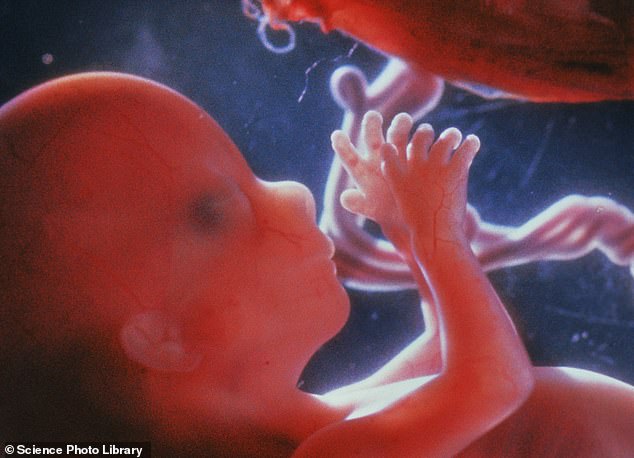Unborn babies may be able to feel pain before reaching 24 weeks, say scientists – meaning they could suffer as they are being aborted.
Until now, the consensus of medical opinion has been that foetuses cannot feel pain before 24 weeks' gestation, after which abortion is illegal in Britain except in special cases.
But two medical researchers, including a 'pro-choice' British pain expert who used to think there was no chance foetuses could feel pain that early, say recent studies strongly suggest the assumption is incorrect.
The studies indicate unborn babies might be able to feel 'something like pain' as early as 13 weeks, they say.
Unborn babies may be able to feel pain before reaching 24 weeks, say scientists – meaning they could suffer as they are being aborted. Pictured: the human foetus at about 12 weeks
Women going for abortions who have reached this stage of pregnancy should be told the foetus could experience pain while being terminated, they argue. And medical staff should ask if the woman wants it to be given pain relief.
To carry on regardless of new evidence 'flirts with moral recklessness', they write in the influential Journal of Medical Ethics.
Last night, anti-abortionists said the scientists' claims should change attitudes towards abortion and the practice of it – suggestions that were swiftly rejected by the country's biggest abortion provider, the British Pregnancy Advisory Service.
The lead author of the controversial article is British professor Stuart Derbyshire, who has acted as a consultant to the Pro-Choice Forum in the UK and Planned Parenthood, a leading American pro-choice organisation.
In 2006, he wrote in the British Medical Journal that avoiding talking to women seeking abortions about foetal pain was 'sound policy based on good evidence that foetuses cannot experience pain'.

Until now, the consensus of medical opinion has been that foetuses cannot feel pain before 24 weeks' gestation, after which abortion is illegal in Britain except in special cases (file image)
But in the JME article, he and American medic John Bockmann say there is now 'good evidence' that the brain and nervous system are sufficiently wired up by 18 weeks for the foetus to feel pain.
Specifically, it has been thought that the cortex, the outer brain layer that deals with sensory information, is not developed enough for pain to register.
As a result, 'many medical bodies… state that pain is not possible before 24 weeks' gestation'. However, recent studies clearly show 'that the consensus is no longer valid', they argue.
One study found an adult with an extensively damaged cortex could still feel pain.
The two medics say their own 'stark differences' on the morality of abortion 'should not interfere with discussion of whether foetal pain is possible'.
Given recent advances in understanding, 'acting as if we have certainty' that foetuses cannot feel pain before 24 weeks 'flirts with a moral recklessness that we are motivated to avoid'.
Their conclusions raise grave questions for the UK's abortion industry, which carried out 218,281 terminations in 2018 – almost a quarter (23 per cent) of all pregnancies. About 6,000 abortions are carried out annually at 18 weeks or later.
Professor Derbyshire and Dr Bockmann advise: 'Given the evidence that the foetus might be able to experience something like pain during later abortions, it seems reasonable that the clinical team and the pregnant woman are encouraged to consider foetal analgesia [pain relief].'
But Clare Murphy, of BPAS, said: 'The most comprehensive review of this issue to date concluded a foetus cannot experience pain before 24 weeks.
'There is nothing in this paper which would lead to a change in practice.' Dr Anthony McCarthy, of the Society for the Protection of Unborn Children, said: 'A society that claims to take seriously animal pain should not shrink from confronting pain inflicted on young human beings in the name of 'choice'.
'Making death painless for the one killed does not, however, mean that taking life is thereby justified.'
Pro-life MP Fiona Bruce said: 'Given developing views and research on foetal pain, the Royal College of Obstetricians and Gynaecologists' guidance on this issue in relation to abortion – which is now nearly ten years old – should be reviewed.'
Cross-bench peer Lord Alton, who is part of a parliamentary inquiry into foetal pain, said: 'This new evidence adds further pressure on Parliament to urgently review our current abortion time limit. We last had a proper debate on time limits in 2008.'
The Royal College of Obstetricians and Gynaecologists did not respond to a request for comment.





























